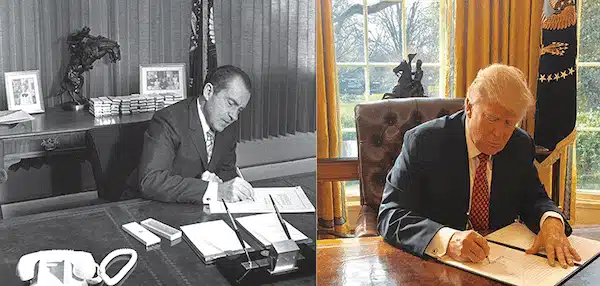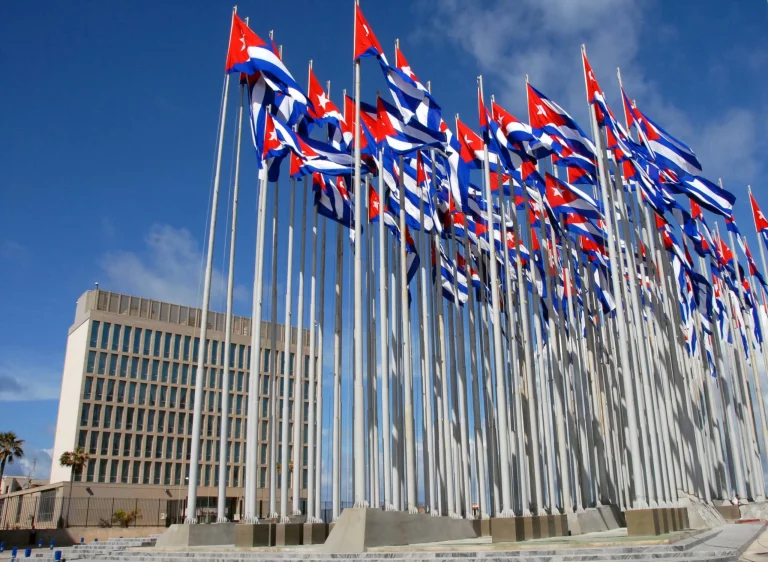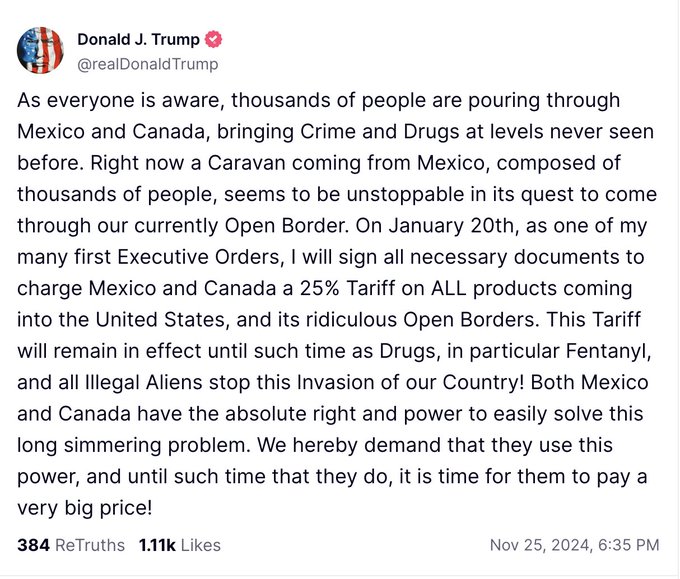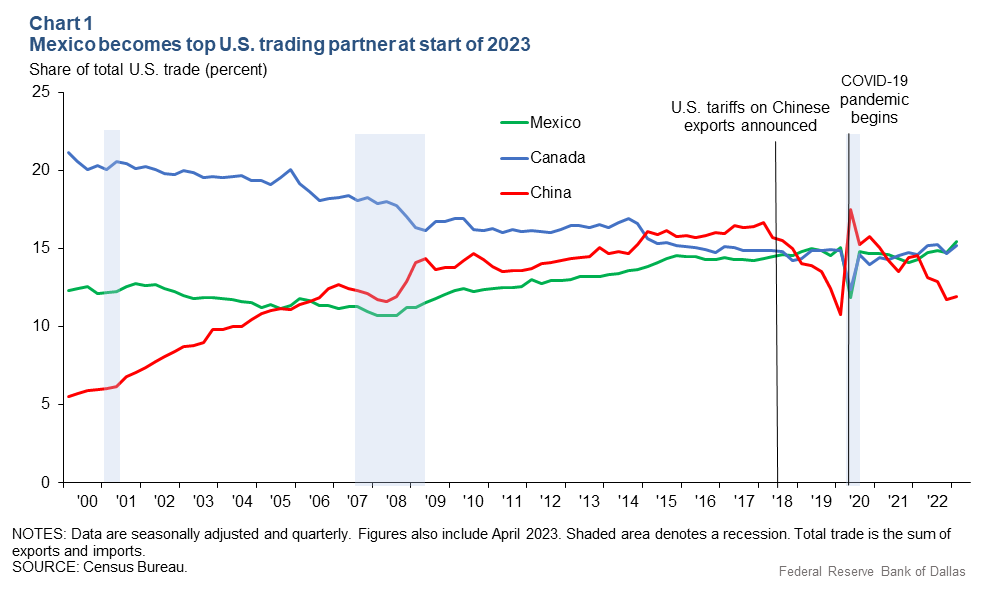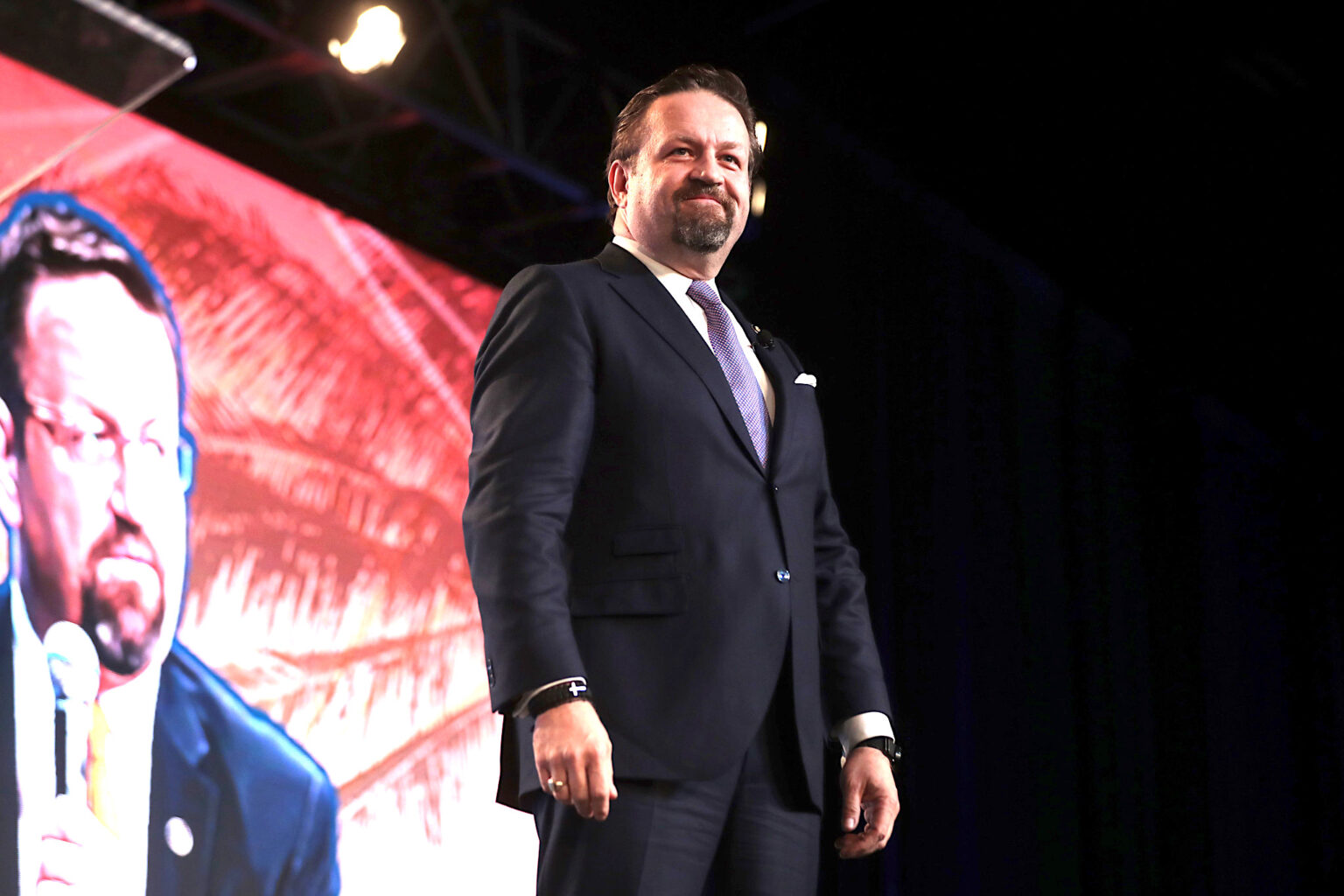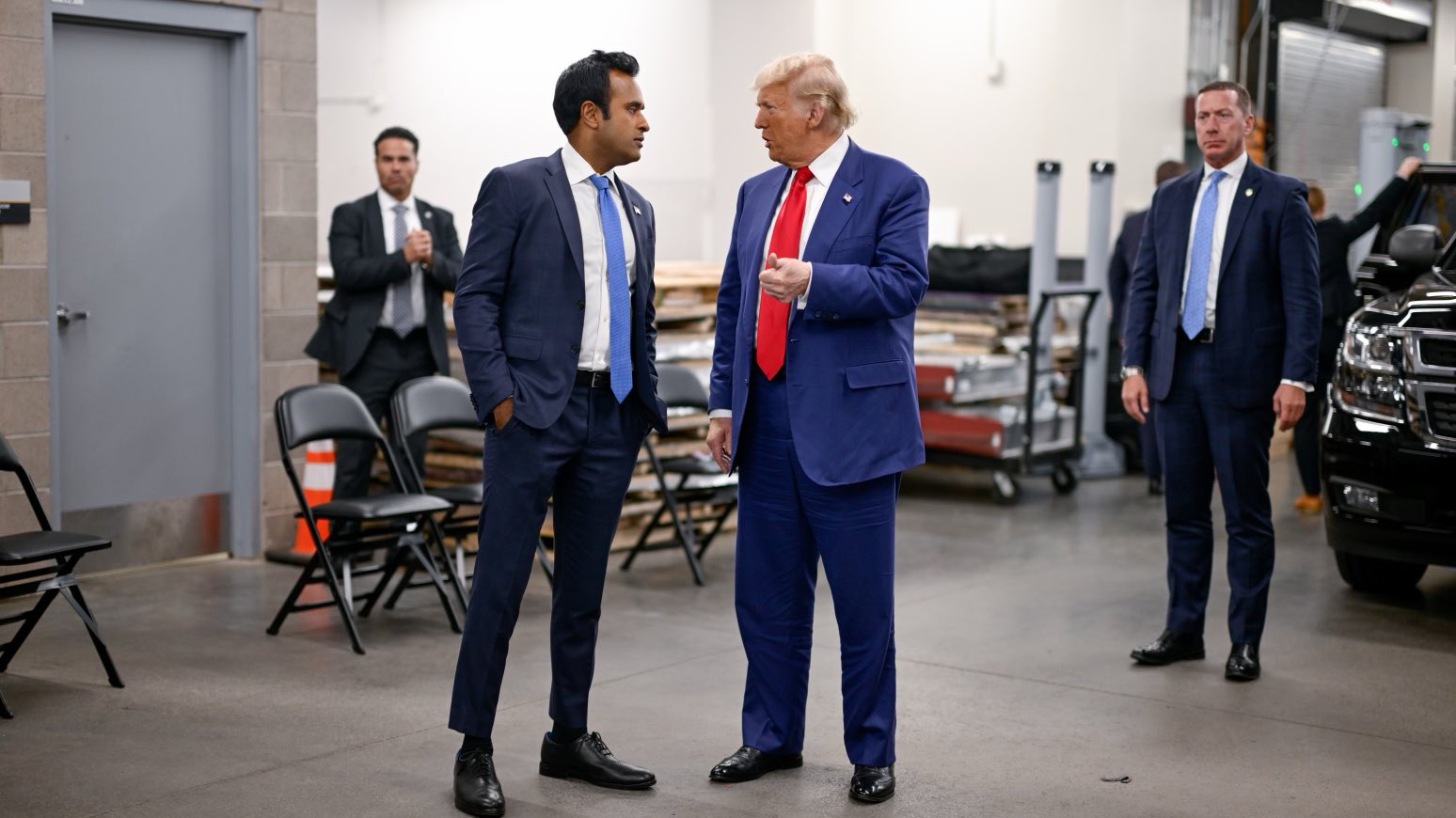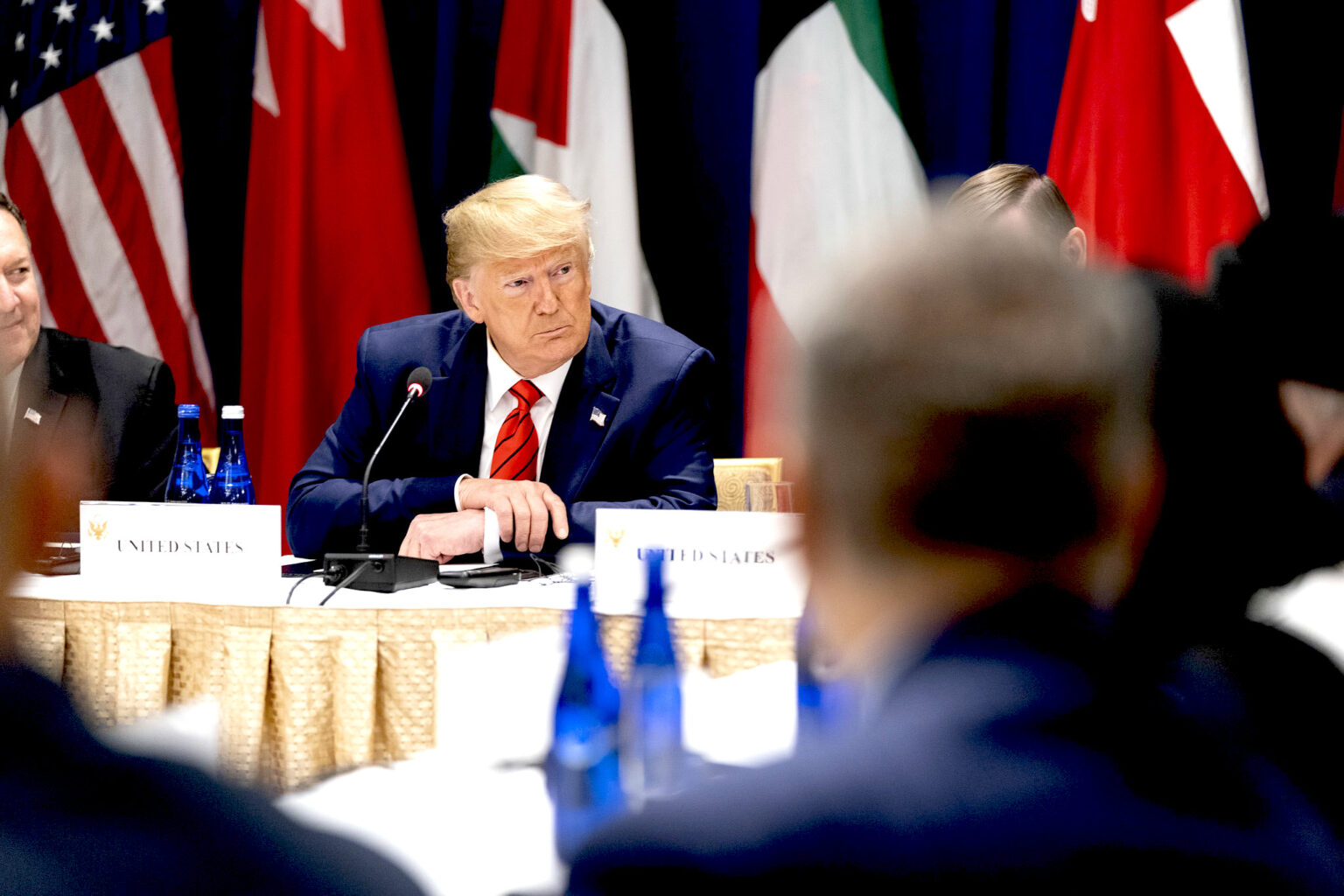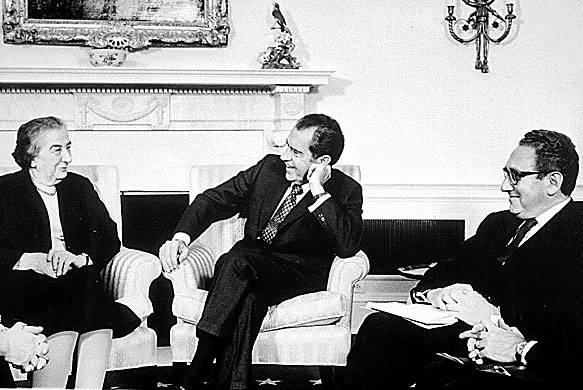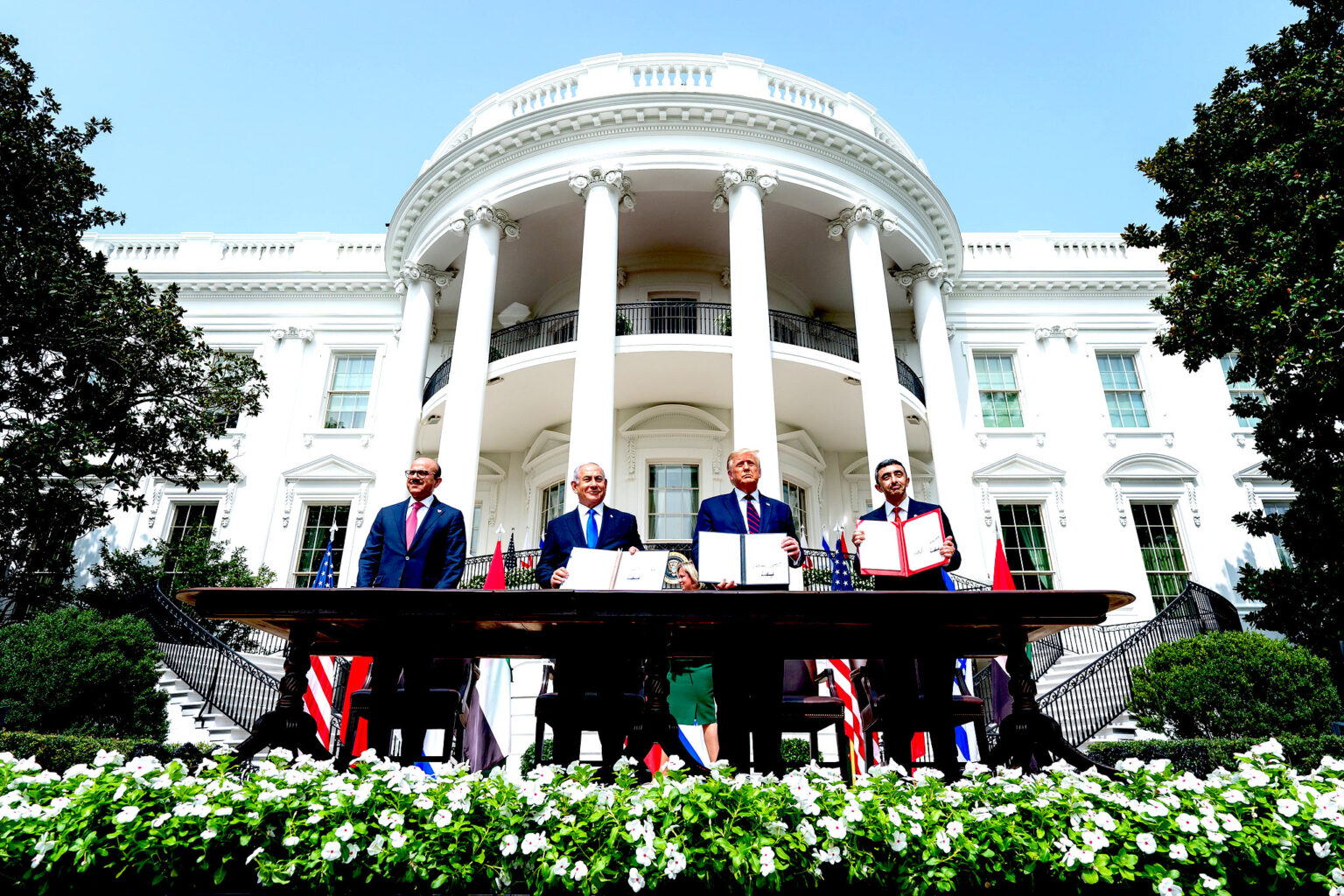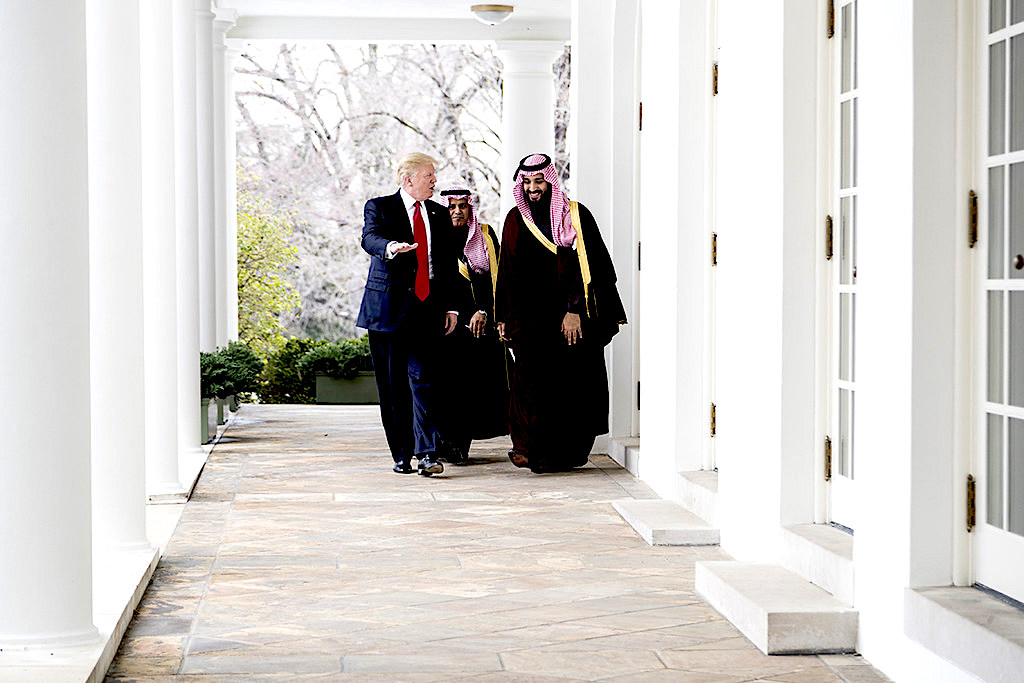November 15, 2024

Far-right US Senator Marco Rubio (left) and Venezuelan Minister for the Interior Diosdado Cabello (right). Photo: X/@intelligencefnt/PSUV.
Marco Rubio, accused of having ties to drug trafficking, will be the first to be fired from Donald Trump’s government, either due to inefficiency or due to some scandal, predicted PSUV leader and Venezuelan Minister for the Interior Diosdado Cabello. He made this comment on Wednesday, November 7, on his program Con El Mazo Dando, referring to US President-elect Donald Trump’s choice of the ultraconservative Marco Rubio to head the US State Department.
“That guy has been attacking Venezuela for 25 years, and now I make a bet: who do you think will be the first to be fired from the Trump administration? I know who! That is easy, Narco Rubio,” Cabello commented, calling Rubio “Narco” for his alleged links to drug trafficking.
The first vice president of the United Socialist Party of Venezuela (PSUV) also dismissed the far-right opposition’s campaign to intimidate Venezuelans with the arrival of Rubio to the State Department.
“Now the savior for these people is not Erik Prince but Narco Rubio,” he joked.
Marco Rubio’s name is quite familiar in Venezuela, and not for positive reasons. Son of ultra-conservative Cuban emigrants, Rubio has made his career in the United States as an extremist voice against governments outside of Washington’s control, such as Cuba, Venezuela, Nicaragua, Iran, and China.
Rubio, born in 1971 in Miami, is considered a US foreign policy hawk, advocating a hardline approach against China and Iran, and the continuation of unilateral coercive measures against Cuba, Venezuela, and Nicaragua. He participated in the primaries for the 2016 Republican presidential nomination, where he lost to Trump.
https://orinocotribune.com/diosdado-cab ... -by-trump/
******
Eight Reasons Why Marco Rubio Would Be a Disastrous Secretary of State
Posted on November 19, 2024 by Yves Smith
Yves here. As this post by Medea Benjamin and Nicholas Davies points out, Macro Rubio is getting much less pushback that most of Trump’s cabinet picks. That means he is conventional-looking as opposed to good, as the checklist below demonstrates.
By Medea Benjamin and Nicolas J. S. Davies, the authors of War in Ukraine: Making Sense of a Senseless Conflict, published by OR Books, with an updated edition due in February 2025. Medea Benjamin is the cofounder of CODEPINK for Peace, and the author of several books, including Inside Iran: The Real History and Politics of the Islamic Republic of Iran. Nicolas J. S. Davies is an independent journalist, a researcher for CODEPINK and the author of Blood on Our Hands: The American Invasion and Destruction of Iraq
Of all Trump’s choices for his foreign policy team, Marco Rubio is the least controversial to the neoconservative foreign policy establishment in Washington, and the most certain to provide continuity with all that is wrong with U.S. foreign policy, from Cuba to the Middle East to China.
The only area where there might be some hope for ending a war is Ukraine, where Rubio has come close to Donald Trump’s position, praising Ukraine for standing up to Russia, but recognizing that the U.S. is funding a deadly “stalemate war” that needs to be “brought to a conclusion.”
But in all the other hot spots around the world, Rubio is likely to make conflicts even hotter, or start new ones.
His obsession with regime change in Cuba will sink any chance of better relations with the island.
Like other Cuban-American politicians, Marco Rubio has built his career on vilifying the Cuban Revolution and trying to economically strangle and starve into submission the people of his parents’ homeland.
It is ironic, therefore, that his parents left Cuba before the Revolution, during the U.S.-backed dictatorship of Fulgencio Batista, whose executioners, secret police and death squads killed an estimated 20,000 people,according to the CIA, leading to a wildly popular revolution in 1959.
When President Obama began to restore relations with Cuba in 2014, Rubio swore to do “everything possible” to obstruct and reverse that policy. In May 2024, Rubio reiterated his zero tolerance for any kind of social or economic contacts between the U.S. and Cuba, claiming that any easing of the U.S. blockade will only “strengthen the oppressive regime and undermine the opposition… Until there is freedom in Cuba, the United States must maintain a firm stance.”
In 2024 Rubio also introduced legislation to ensure that Cuba would remain on the U.S. “State Sponsor of Terrorism List,” imposing sanctions that cut Cuba off from the U.S.-dominated Western banking system.
These measures to destroy the Cuban economy have led to a massive wave of migration in the past two years. But when the U.S. Coast Guard tried to coordinate with their Cuban counterparts, Rubio introduced legislation to prohibit such interaction. While Trump has vowed to stem immigration, his Secretary of State wants to crush Cuba’s economy, forcing people to abandon the island and set sail for the United States.
Applying his anti-Cuba template to the rest of Latin America will make enemies of more of our neighbors.
Rubio’s disdain for his ancestral home in Cuba has served him so well as an American politician that he has extended it to the rest of Latin America. He has sided with extreme right-wing politicians like Jair Bolsonaro in Brazil and Javier Milei in Argentina, and rails against progressive ones, from Brazil’s Ignacio Lula da Silva to Mexico’s popular former President Lopez Obrador, whom he called “an apologist for tyranny” for supporting other leftist governments.
In Venezuela, he has promoted brutal sanctions and regime change plots to topple the government of Nicolas Maduro. In 2019 he was one of the architects of Trump’s failed policy of recognizing opposition figure Juan Guaido as president. He has also advocated for sanctions and regime change in Nicaragua.
In March 2023, Rubio urged President Biden to impose sanctions on Bolivia for prosecuting leaders of a 2019 U.S.-backed coup that led to massacres that killed at least 21 people.
Rubio also condemned the government of Honduras for withdrawing from an extradition treaty with the United States this past August, in response to decades of U.S. interference that had turned Honduras into a narco-state riven by poverty, gang violence and mass emigration, until the election of democratic socialist President Xiomara Castro in 2022.
Rubio’s major concern about Latin America now seems to be the influence of China, which has become the leading trade partner of most Latin American countries. Unlike the U.S., China focuses on economic benefits and not internal politics, while American politicians like Marco Rubio still see Latin America as the U.S. “backyard.”
While Rubio’s virulent anti-leftist stands have served him well in climbing to senior positions in the U.S. government, and now into Trump’s inner circle, his disdain for Latin American sovereignty bodes ill for U.S. relations with the region.
He believes the US and Israel can do no wrong, and that God has given Palestine to Israel.
Despite the massive death toll in Gaza and global condemnation of Israel’s genocide, Rubio still perpetuates the myth that “Israel takes extraordinary steps to avoid civilian losses” and that innocent people die in Gaza because Hamas has deliberated placed them in the way and used them as human shields. The problem, he says, is “an enemy that doesn’t value human life.”
When asked by CODEPINK in November 2024 if he would support a ceasefire, Rubio replied, “On the contrary. I want them to destroy every element of Hamas they can get their hands on. These people are vicious animals.”
There are few times in this past year that the Biden administration has tried to restrain Israel, but when Biden begged Israel not to send troops into the southern city of Rafah, Rubio said that was like telling the Allied forces in World War II not to attack Berlin to get Hitler.
In a letter to Secretary of State Blinken in August 2024, Rubio criticized the Biden administration’s decision to sanction Israeli settlers linked to anti-Palestinian violence in the occupied West Bank.
“Israel has consistently sought peace with the Palestinians. It is unfortunate that the Palestinians, whether it be the Palestinian Authority or FTOs [Foreign Terrorist Organisations] such as Hamas, have rejected such overtures,” Rubio wrote. “Israelis rightfully living in their historic homeland are not the impediment to peace; the Palestinians are,” he added.
No country besides Israel subscribes to the idea that its borders should be based on 2,000-year-old religious scriptures, and that it has a God-given right to displace or exterminate people who have lived there since then to reconquer its ancient homeland. The United States will find itself extraordinarily isolated from the rest of the world if Rubio tries to assert that as a matter of U.S. policy.
His deep-seated enmity toward Iran will fuel Israel’s war on its neighbors, and may lead to a U.S. war with Iran.
Rubio is obsessed with Iran. He claims that the central cause of violence and suffering in the Middle East is not Israeli policy but “Iran’s ambition to be a regional hegemonic power.” He says that Iran’s goal in the Middle East is to “seek to drive America out of the region and then destroy Israel.”
He has been a proponent of maximum pressure on Iran, including a call for more and more sanctions. He believes the U.S. should not re-enter the Iran nuclear deal, saying: “We must not trade away U.S. and Israeli security for vague commitments from a terrorist-sponsoring regime that has killed Americans and threatens to annihilate Israel.”
Rubio calls Lebanon’s Hezbollah a “full blown agent of Iran right on Israel’s border” and that wiping out Hezbollah’s leadership, along with entire neighborhoods full of civilians, is a “service to humanity.” He alleges that Iran has control over Iraq, Syria, the Houthis in Yemen and is a threat to Jordan. He claims that “Iran has put a noose around Israel,” and says that the goal of U.S. policy should be regime change in Iran, which would set the stage for war.
While there will hopefully be leaders in the Pentagon who will caution Donald Trump about the perils of a war with Iran, Rubio will not be a voice of reason.
He is beholden to big money, from the weapons industry to the Israel lobby.
Open Secrets reports that Rubio has received over a million dollars in campaign contributions from pro-Israel groups during his career. The Pro-Israel America PAC was his single largest campaign contributor over the last 5 years. When he last ran for reelection in 2022, he was the third largest recipient of funding by pro-Israel groups in the Senate, taking in $367,000 from them for that campaign.
Rubio was also the fourth largest recipient of funding from the “defense” industry in the Senate for the 2022 cycle, receiving $196,000. Altogether, the weapons industry has invested $663,000 in his Congressional career.
Rubio is clearly beholden to the US arms industry, and even more so to the Israel lobby, which has been one of his largest sources of campaign funding. This has placed him in the vanguard of Congress’s blind, unconditional support for Israel and subservience to Israeli narratives and propaganda, making it unlikely that he will ever challenge the ongoing extermination of the Palestinian people or their expulsion from their homeland.
He’s so antagonistic towards China that China has sanctioned him–twice!
Speaking at the Heritage Foundation in 2022, Rubio said: “The gravest threat facing America today, the challenge that will define this century and every generation represented here, is not climate change, the pandemic, or the left’s version of social justice. The threat that will define this century is China.”
It will be hard for our nation’s “top diplomat” to ease tensions with a country he has so maligned. He antagonized China by co-sponsoring the Uyghur Forced Labor Prevention Act, which allows the U.S. to bar Chinese imports over alleged Uyghur rights abuses, abuses that China denies and independent researchersquestion. In fact, Rubio has gone so far as to accuse China of a “grotesque campaign of genocide” against the Uyghurs.
On Taiwan, he has not only introduced legislation to increase military aid to the island, but actually supports Taiwanese independence — a dangerous deviation from the US government’s long-standing One China approach.
The Chinese responded to Rubio by sanctioning him, not once but twice–once regarding the Uyghurs and once for his support of Hong Kong protests. Unless China lifts the sanctions, he would be the first U.S. secretary of state to be banned from even visiting China.
Analysts expect China to try to sidestep Rubio and engage directly with Trump and other senior officials. Steve Tsang, the director of the China Institute at the U.K.’s School of Oriental and African Studies, told Reuters, “If that doesn’t work, then I think we’re going to get into a much more regular escalation of a bad relationship.”
Rubio knows sanctions are a trap, but he doesn’t know how to escape.
Rubio is a leading advocate of unilateral economic sanctions, which are illegal under international law, and which the UN and other countries refer to as “unilateral economic coercive measures.”
The United States has used these measures so widely and wildly that they now impact a third of the world’s population. U.S. officials, from Treasury Secretary Yellen to Rubio himself, have warned that using the U.S. financial system and the dollar’s reserve currency status as weapons against other countries is driving the rest of the world to conduct trade in other currencies and develop alternative financial systems.
In March 2023, Rubio complained on Fox News, “We won’t have to talk sanctions in five years, because there will be so many countries transacting in currencies other than the dollar, that we won’t have the ability to sanction them.”
And yet Rubio has continued to be a leading sponsor of sanctions bills in the Senate, including new sanctions on Iran in January 2024 and a bill in July to sanction foreign banks that participate in alternative financial systems.
So, while other countries develop new financial and trading systems to escape abusive, illegal U.S. sanctions, the nominee for Secretary of State remains caught in the same sanctions trap that he complained about on Fox.
He wants to crack down on U.S. free speech.
Rubio wants to curtail the right to free speech enshrined in the First Amendment of the U.S. Constitution. In May, he described campus protests against Israel as a “complete breakdown of law and order.”
Rubio claimed to be speaking up for other students at American universities. “[They] paid a lot of money to go to these schools, [but are being disrupted by] a few thousand antisemitic zombies who have been brainwashed by two decades of indoctrination in the belief that the world is divided between victimizers and victims, and that the victimizers in this particular case, the ones that are oppressing people, are Jews in Israel,” said Rubio.
The Florida senator has said he supports Trump’s plan to deport foreign students who engage in pro-Palestinian campus protests. In April, he called for punishing supporters of the Israel boycott movement as part of efforts to counter antisemitism, falsely equating any attempt to respond to Israel’s international crimes with antisemitism.
And what about those crimes, which the students are protesting? After visiting Israel in May, Rubio wrote an article for National Review, in which he never mentioned the thousands of civilians Israel has killed, and instead blamed Iran, Biden and “morally corrupt international institutions” for the crisis.
Marco Rubio expects Americans to believe that it is not genocide itself, but protests against genocide, that are a complete breakdown of law and order. He couldn’t be more wrong if he tried.
Students are not Rubio’s only target. In August 2023, he alleged that certain “far-left and antisemitic entities” may have violated the Foreign Assistance Registration Act by their ties to China. He called for a Justice Department investigation into 18 groups, starting with CODEPINK. These unfounded claims of China connections are only meant to intimidate legitimate groups that are exercising their free speech rights.
Conclusion
On each of these issues, Rubio has shown no sign of understanding the difference between domestic politics and diplomacy. Whether he’s talking about Cuba, Palestine, Iran or China, or even about CODEPINK, all his supposedly tough positions are based on cynically mischaracterizing the actions and motivations of his enemies and then attacking the “straw man” he has falsely set up.
Unscrupulous politicians often get away with that, and Rubio has made it his signature tactic because it works so well for him in American politics. But that will not work if and when he sits down to negotiate with other world leaders as U.S. secretary of state.
His underlying attitude to foreign relations is, like Trump’s, that the United States must get its way or else, and that other countries who won’t submit must be coerced, threatened, couped, bombed or invaded. This makes Rubio just as ill-equipped as Antony Blinken to conduct diplomacy, improve U.S. relations with other countries or resolve disputes and conflicts peacefully, as the UN Charter requires.
https://www.nakedcapitalism.com/2024/11 ... state.html
Thomas Neuburger: Tulsi Gabbard’s DNI Nomination
Posted on November 20, 2024 by Yves Smith
Yves here. Despite Tulsi Gabbard having loudly and consistently opposed US “regime change wars” and taking political risk to do so (like meeting with Assad), Tom Neuburger reminds us that she’s a hawk on other issues, like supporting Israel. He still comes out for her, albeit not with much enthusiasm.
One other factor in favor of Gabbard is that she intends to leash and collar the CIA. Even though the CIA, along with other intelligence agencies, on paper reports to the Director of National Intelligence, in practice the CIA calls its own shots and has privileged access to the President via its daily briefings. The mere weight of numbers makes the CIA a force to be reckoned with. The DNI has 1,750 employees, while the CIA has over 21,500, and that’s before you add in a very large population of assets.
Making the CIA more accountable, even if only to the President and other minders, is a very tall order. If Gabbard were nominated and made any progress, that would be a major accomplishment in and of itself. The CIA will argue it needs to operate in secret or its operations will be impaired (mind you, if it really is mainly in the regime change business, Gabbard would see that as an entirely good thing). One way to check the agency might be to release historical records largely unredacted. It would be hard to argue that anything before 1990 has any current value….save exposing how dirty the spook business really is.
CNN points out that Presidential nominees are almost without exception waved through:
For all the drama generated every four years by Cabinet appointments, defeat of a nominee by a vote in the Senate is extremely rare.
The only time a nominee by a new president was rejected by a Senate vote occurred in 1989, when George H.W. Bush nominated John Tower, a former senator from Texas, to be his secretary of defense.
Tower was undone by stories of his excessive drinking and what press reports at the time referred to as “womanizing,” and which Pentagon files back then documented as placing “special attention on the secretaries” as an arms negotiator in Geneva.
On the other hand, most of Trump’s nominees are, erm, way out of band. Dr. Oz at the Center for Medicare and Medicaid services amounts to trolling. There may be enough TDS + a desire among those not afflicted to remind Trump of guardrails that the Senate might block a nominee to make a point. But I doubt there is enough coordination for that to be a plan, as opposed to desire. Will that sentiment coalesce around one candidate, or be too diffuse to create a real obstacle?
In the meantime, I would very much like it it Gabbard were to use her opening statement to make a modern version of the “Have you no sense of decency, sir?” speech that brings down or at least dents Russiagate in the way Joseph Welch finished off Joe McCarthy.
By Thomas Neuburger. Originally published at God’s Spies
“When it comes to the war against terrorists, I’m a hawk. When it comes to counterproductive wars of regime change, I’m a dove.”
—Tulsi Gabbard, 2016
The list of Donald Trump’s picks for cabinet posts is filling up fast. Some are relentlessly awful, like Chris Wright, a fossil fuel CEO, for Department of Energy; Mike Huckabee, pretend Christian for Ambassador to Israel; Lee Zeldin, Trump loyalist for EPA; and the racist Stephen Miller for, well, anything.
But other nominations are more mixed. Many decry Matt Gaetz for “ethical issues,” though others, notably progressives, praise his antitrust advocacy, his opposition to corporate power — especially Big Tech — his support for Lina Khan, his opposition to congressional insider trading, his dislike of corporate stock buybacks and his stance against government surveillance.
Which brings me to Tulsi Gabbard, another mixed nomination.
Tulsi Gabbard
Much has been written about Trump’s pick of Tulsi Gabbard for Director of National Intelligence. This is perhaps the most powerful job in the National Security State — the CIA, Defense Intelligence Agency (DIA) and NSA all report to the DNI. The President is certainly more powerful, and the CIA chief may be as well, given that so much of what the Agency does is hidden, known only perhaps to itself. But the DNI is clearly one of the major hubs around which security happens.
For this discussion, let’s focus primarily on Jeremy Scahill’s evaluation of Gabbard’s nomination. He’s gathered as many of her pluses and minuses as anyone, and Gabbard, to my eyes, is certainly a mixed nomination.
Virtue and Vice
Scahill on what he (and I) consider her virtues (all emphasis mine):
If confirmed as the next Director of National Intelligence, Gabbard would represent one of the most unorthodox political figures to hold such a senior national security post in U.S. history. A veteran of the war in Iraq, Gabbard was elected to Congress in 2012 and emerged as a sharp critic of the U.S. forever wars launched in the aftermath of the 9/11 attacks. She denounced U.S. regime change wars, including the 2011 overthrow of Muammar Gaddafi in Libya, and consistently opposed U.S. support for Saudi Arabia’s scorched earth war against Yemen, which extended from Barack Obama to Donald Trump. On multiple occasions, she accused Trump of being “Saudi Arabia’s bitch,” taking orders from his Saudi “masters,” and of supporting Al Qaeda. She has called for pardoning whistleblowers Julian Assange and Edward Snowden and fought to change U.S. laws permitting domestic surveillance of Americans.
These are all points in the anti-imperialist ledger. Yet she also brings this to the role:
Gabbard is not an antigen infiltrating the U.S. intelligence system. Over the past four years she has fully embraced Trump’s America First posture in explaining her dissent from the elite foreign policy consensus. Gabbard also has a history of support for a slew of standard, bipartisan U.S. national security and defense policies. She has offered die-hard backing for Israel’s war against Gaza, opposed a ceasefire, and accused Joe Biden and Kamala Harris, the chief facilitators of Israel’s genocidal war, of being soft on terrorism and anti-semitism. She has also argued that the U.S. and other Western nations should wage both a military and ideological war against what she calls “radical Islamist ideology.” She has described herself as a “hawk” when it comes to using military action against “terrorists” and has advocated using “surgical” drone strikes against terror groups, a system refined and expanded under the Obama and Trump administrations. She has praised Egyptian dictator Abdel Fatah al-Sisi for his “great courage and leadership” and, following a 2015 meeting with Sisi in Cairo, called on Obama to “take action to recognize President el-Sisi and his leadership.” In Congress, Gabbard voted to keep in place U.S. surveillance laws aimed at foreign nationals and nations and supported economic sanctions against Russia, Iran, and North Korea.
There’s also this: “Gabbard also has close ties to far right Hindu nationalists with an explicitly violent anti-Muslim agenda and an alliance with Israel and extremist Zionists.”
As I say, a very mixed bag.
Opposition to Gabbard
Opposition to this nomination comes in two flavors, covert and overt.
The overt flavor is some form of Hillary Clinton’s charge that Gabbard is a “Russian asset.” The context was the 2020 Democratic primary in which Gabbard appeared to be making some early gains. Clinton also said, “I think they’ve got their eye on somebody who is currently in the Democratic primary and are grooming her to be the third-party candidate.” A Clinton spokesperson later made clear the remarks were directed at Gabbard.
In the same interview Clinton called Jill Stein a “Russian asset. I mean, totally.” No evidence was ever offered for either charge, the one against Stein or Gabbard.
These accusations are improbable in the extreme. Gabbard is an Iraq War veteran, a former member of Congress and a serving Lt. Col. in the Army Reserve. Despite being labeled a traitor, she’d be up on charges for sure if even a scrap of evidence existed to back this up. But “Russia” is a good trigger word for much of America, though it’s losing effectiveness fast — witness “cultivated Russian asset” Donald Trump’s comfortable reelection.
But I think that’s the cover story, the bright red flag. The actual opposition comes from the bipartisan military state, the one that wants all its wars, all the money that goes with it, and no talking back.
By this analysis, Gabbard’s pro-militarist “virtues”…
Support for the Gaza genocide
Support for the Forever War against “radical Islam”
Support for drone attacks against “terror cells”
…are not outweighed by her multiple heresies:
Sees Putin’s invasion of Ukraine as security-based
Thinks that NATO expansion is a destabilizing force (she shares this view with George Kennan — that George Kennan — and Thomas Friedman)
Understands that domestic surveillance is a political threat, thanks to her own experience of being placed on the TSA’s Quiet Skies program. Gabbard: “Given this environment, it’s impossible to feel free. No American deserves this. No American deserves to live in fear of our own government.”
In my view, the State wants a robot in office, and she’s not it.
Her Confirmation
Will she be confirmed? Krystal Ball has said in one of her Thursday segments that, this time around, Trump has everything gamed out. That’s possible; in my view his goal is now governing in the “I’m going to shake things up” sense. He wants his own retribution and intends to rule, unlike before when his goal was to just bathe in glory.
So he may be fully committed to her confirmation, despite the U.S. foreign policy establishment, which has committed itself for decades to a long war against Russia. We’ll have to see on that.
Preferring The Lesser Evil
Democrats and their supporters are well aware of the “lesser evil” principle. “Vote for not that” has been their rallying cry for quite a few years. Unless you buy into (in my view) the clear propaganda that Gabbard’s an actual spy — or unless you want real war with Russia — Gabbard’s the lesser evil compared to a blood-and-guts Blob representative, Blinken or Sullivan, say, or Trump’s NSA pick Mike Waltz, against whom she’ll contend.
I therefore recommend supporting her confirmation. If it fails, consider that a win for the warlike State — and prepare accordingly.
At some point our global violence will be sent back home. We’re too soft a target and too many non-Americans have had enough. If they finally decide to get their own retribution, to show us what casual slaughter feels like up close, you won’t want to be around when that occurs.
https://www.nakedcapitalism.com/2024/11 ... ation.html
Yeah, well, mebbe... and mebbe she's just another cheap-jack hustler grabbing a seat on the Trump Train. We'll see. I greatly doubt that she can(be allowed to) 'leash' the spooks.
Sometimes the lesser evil does exist, but not usually.
























